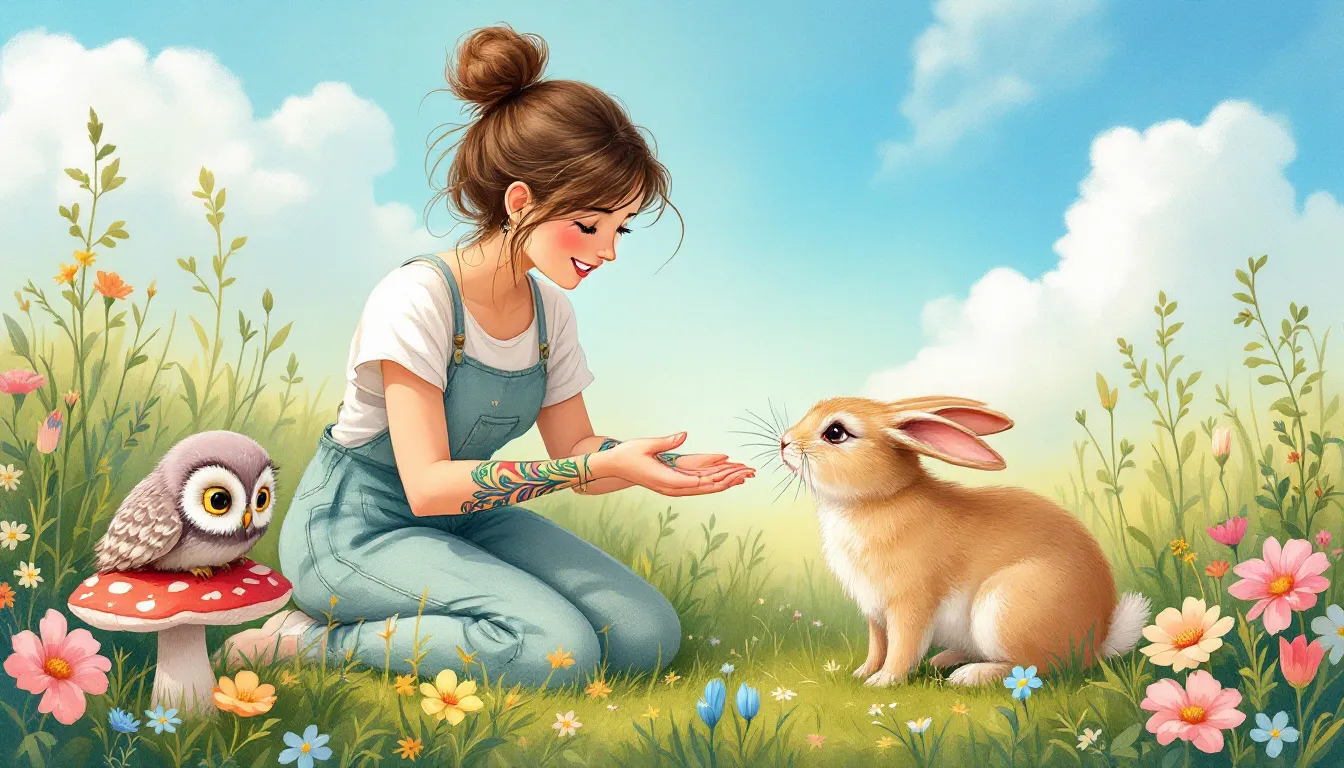Picking up a pet rabbit can be tricky and needs to be done properly to avoid stress for the rabbit and potential injury. In this guide, you’ll learn how to pick up a pet rabbit safely, ensuring comfort and security for your furry friend.
Key Takeaways
- Establish a calm and secure environment for rabbits before handling to minimize stress and ensure safety.
- Build trust through positive reinforcement and patience, allowing rabbits to approach on their own terms and recognizing their body language.
- Use proper hand placement and techniques when lifting or handling rabbits to prevent injuries and enhance their comfort.
Preparing to Pick Up Your Rabbit

Begin by creating a safe and calm environment to pick up your rabbit safely. Rabbits are prey animals and can be easily startled by sudden movements or loud noises. A serene atmosphere keeps them calm and reduces stress. It is best to settle next to your rabbit before picking it up. Approach your rabbit in a quiet, calm, and confident manner, as this will make them feel more secure. Rabbits dislike being picked up due to their natural instincts as prey animals, so patience and care are essential.
Rabbits prefer to stay on the ground, as this aligns with their natural instincts to feel safe from predators. The best place to handle your rabbit is on the floor, free of obstacles and preferably on a soft surface. Using treats can also be a great way to lure your rabbit into the handling area and make them feel more comfortable. A tasty treat can make the handling process a positive experience for your rabbit.
Provide a hiding spot so they can retreat if they feel threatened, giving them a sense of control. Allow your bunny to approach you in their own time, and avoid forcing them out of their comfort zone too quickly by providing hiding places.
Building Trust with Your Rabbit

Building trust is crucial for safely handling your rabbit. Spend time with your rabbit in a secure enclosure and let them approach you to build trust. This creates a comfortable environment where your rabbit feels safe. Approach your rabbit slightly to one side rather than head-on to avoid causing fear.
Pay close attention to your rabbit’s body language. Ears tilted back and a tense rabbit’s body can indicate that your rabbit is nervous. A rabbit that lunges or runs away may associate being picked up with fear. Back off and let your rabbit come out when they feel ready.
Rabbits sense their owner’s emotions, so stay calm and composed. Let your pet rabbit approach you and offer treats to build trust through positive reinforcement. If your rabbit startsles when touched, repeat the petting until they get used to it.
Being patient and consistent is key. With time, your rabbit will associate your presence with positive experiences. If your rabbit growls or grunts, respect their space and stop.
Proper Hand Placement for Lifting
Proper hand placement is essential for lifting your rabbit safely. Place one hand under the rabbit’s chest to support its front legs. Your other hand should be positioned under the hind legs to provide additional support and ensure secure weight distribution. The simplest method to pick up a rabbit involves supporting its front by placing one hand under the chest, while the other hand cradles the back end from beneath the rump.
Always keep your rabbit close to your body during the lift. This not only offers extra stability but also prevents the rabbit from escaping or injuring itself. Close contact helps your rabbit feel secure and less likely to panic.
Make sure both hands are in place before gently lifting. Using two hands to support the rabbit’s chest and hind legs prevents injury and makes lifting smoother and more comfortable for your rabbit.
Gently Lifting Your Rabbit

Begin with small, gradual lifts where the rabbit’s feet just leave the floor. This slowly introduces the concept of lifting, reducing stress. Make sure your rabbit is comfortable with your hands in the lifting position before proceeding.
When lifting, support the rabbit’s chest with one hand and its back legs with the other. Hold the rabbit securely against your body for added stability and comfort. If a rabbit starts to wriggle, gently hug it closer to you until it settles down. This close contact helps the rabbit feel safer and less likely to panic.
Avoid lifting your rabbit very high off the ground. Keeping them close to the floor is safer. Minimal lifting ensures the rabbit feels secure and reduces the risk of accidents. Lift slowly and gently to avoid startling the rabbit.
Remain calm and composed during the lifting process. Your rabbit will pick up on your demeanor, and maintaining a calm atmosphere will help keep them at ease. Once lifted, hold your rabbit securely and support its body fully to ensure a safe and comfortable experience.
Ensuring Comfort During Handling
Your rabbit’s comfort during handling is crucial. Here are some tips to help your rabbit feel more secure during the process:
- Covering your rabbit’s eyes with a towel can help them feel more secure.
- Use calm voices to soothe your rabbit.
- Make slow movements to help your rabbit feel more at ease.
Avoid slippery surfaces, as they can make your rabbit feel insecure. Instead, use a towel or a soft surface to provide better footing. Supporting the rabbit’s feet against your body during lifting helps them feel secure and reduces struggling.
Lift at ground level to prevent falls and ensure safety. If your rabbit struggles, lower your stance and let them sit and grab go rather than forcing control. To avoid injury, lower the rabbit carefully to the ground or into a carrier while maintaining a firm grip. This helps build trust and allows your rabbit to hop, jump, and run free, reducing the risk of injury.
Limit handling time to avoid stressing your rabbit. Keep handling things short and positively to avoid stress. This will help your rabbit feel more comfortable and secure during future handling sessions.
How to Teach Children to Handle Rabbits

Teaching children to handle rabbits safely is crucial for both the child’s and the rabbit’s well-being. Supervise children when they handle rabbits to prevent accidental harm. Children should pick up rabbits only under supervision to ensure safety.
Encourage children to gently stroke rabbits while feeding to build comfort before holding. This creates a positive association with nature and helps the rabbit become comfortable with the child’s touch.
Guide children to pick up a rabbit by sitting on the ground with the rabbit on their lap and inviting it over. Early socialization helps domestic rabbits learn to associate human contact with positive experiences. Socialization and handling when young can prevent fear of being picked up later. Positive reinforcement methods can enhance the bond between the rabbit’s owner and the rabbit.
Common Mistakes to Avoid
Avoiding common mistakes is crucial for safely handling rabbits and bunnies. Never lift rabbits by their ears or hold them on their backs, as this causes extreme stress and potential injury. Lifting by the ears is particularly harmful and should be avoided. Additionally, never pick up a rabbit by its ears, legs, scruff, or tail, as these methods can cause severe harm and distress.
Scruffing, or lifting by the skin on the back of its neck, is discouraged. Use proper handling techniques to ensure the rabbit’s safety and comfort. Holding wild rabbits upside down or on their backs is highly stressful and should be avoided.
Start by listing some forbidden forms of the keyword “carefully” according to Rule 5. Use gentle and proper handling techniques to ensure your rabbit’s well-being. Carefully avoiding these mistakes will create a positive handling experience for you and your pet.
Tips for Handling Nervous Rabbits

Handling a nervous rabbit requires patience and gradual steps. Offer treats to create a positive association during handling. Gradual and patient introduction helps to slowly introduce a rabbit afraid of being picked up.
Change your rabbit’s association with fear during lifting. Continuously picking up a scared rabbit reinforces its fear, so be patient and gradual in your approach. Desensitize the rabbit to handling to reduce the likelihood of biting.
If your rabbit panics while being picked up, it might bite or injure itself from jumping. When a rabbit struggles, it can lead to injuries, so handle them gently and calmly. After lowering a rabbit to the ground, give it a head scratch to reinforce positive associations.
Summary
Handling a rabbit safely involves patience, proper technique, and a deep understanding of your pet’s needs. By maintaining a calm environment, building trust, and using the correct lifting methods, you can ensure a positive experience for both you and your rabbit.
Avoiding common mistakes and understanding how to handle nervous rabbits will further enhance your ability to care for your pet. Remember to always support your rabbit’s body and keep them close to you during handling to provide the necessary stability and comfort.
With time and practice, you and your rabbit will develop a strong bond, making handling a natural and stress-free part of your daily routine.
Frequently Asked Questions
How often should I handle my rabbit?
You should handle your rabbit daily in short, positive sessions to build trust and minimize stress. Consistency in interaction is key to fostering a strong bond.
What if my rabbit is always scared?
If your rabbit is always scared, focus on providing a calm environment and utilize treats to create positive associations with handling. Gradual introductions and patience will help build their trust over time.
What are the signs of a stressed rabbit?
Signs of a stressed rabbit include a tense body, ears tilted back, vocalizations, and hiding. It is important to give your rabbit space if you observe these behaviors.
How can I make handling a positive experience for my rabbit?
To ensure a positive experience when handling your rabbit, use treats, maintain a calm environment, and handle them gently and correctly. This approach will foster trust and comfort in your interactions.
How do I know if I’m handling my rabbit correctly?
To ensure proper handling of your rabbit, support its chest and hind legs while keeping it close to your body, and avoid sudden movements or lifting it too high. This approach will help your rabbit feel secure and safe in your care.



